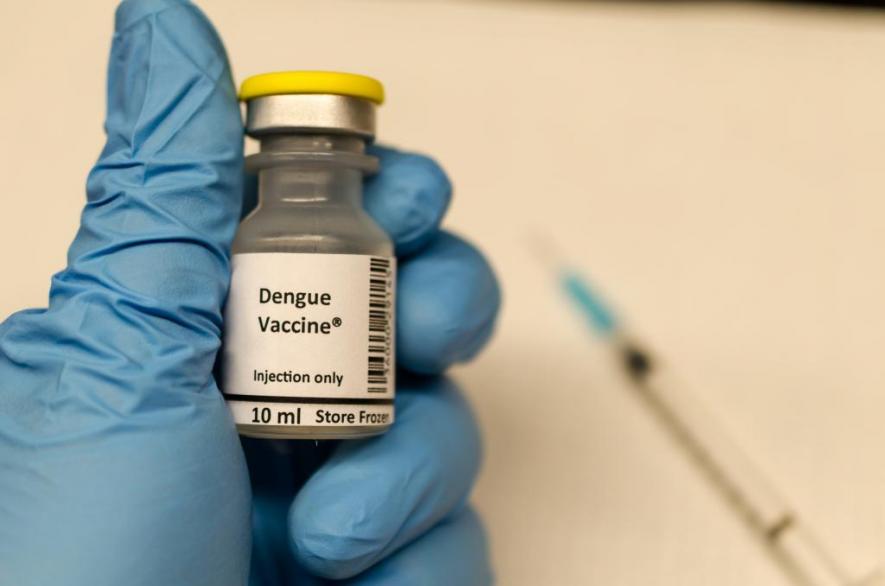New Dengue Vaccine Claims Success, But Apprehensions Remain

Image for representational use only.Image Courtesy : Down to earth.
Dengue fever is a worldwide concern now, with exponential increase in the number of people infested by it across the world. The search for an effective vaccine against dengue has been going on for several years. Now, a recent experimental vaccine claims to have achieved promising early results in a large multi-country trial. It was reported in the New England Journal of Medicine that the new tetravalent vaccine has obtained an efficacy of 80.2%. Nevertheless, critical concerns regarding the safety and effectiveness of the vaccine still exist, due to previous experiences with dengue vaccines.
The new vaccine strategy employs a weakened strain of the dengue virus and randomly distributed it or a placebo to 20,000 children aged 4 to 16 years. The trial was conducted in eight countries across Asia and Latin America, where the disease appears endemic. It was monitored for a year and 12 months after the participants received their second and final dose, the researchers compared how many among them in the placebo and the vaccine group developed confirmed cases of infection by any of the four different strains of dengue virus that are currently known.
The researchers reported that the vaccine had an efficacy of 97.7% against the dengue 2 strain. But the figure dropped to 73.7% for the serotype (strain) 1 and even more to 62% for serotype 3. There were also few infections with strain 4.
The new vaccine’s strong protection against the serotype 2 is not very surprising, because the vaccine includes a harmless version of serotype 2 and it is also the backbone of the vaccine. A few genes from the other serotypes have also been put into the virus to create the tetravalent vaccine.
Old Apprehensions Still Exist With New Vaccine
Dengvaxia, a vaccine made by the French company Sanofi was applied to 1 million children in Philippines. But after three years of its mass application, serious problems with Dengvaxia appeared. It was realised that the vaccine could, in some children, worsen the condition rather than protecting them.
Philippines had launched a wide campaign in 2016 to vaccinate school children against the mosquito borne virus. The new vaccine named TAK-300 has a similar strategy as that of the previous vaccine and experts believe that it is too early to claim anything about it and the history should not be repeated in this case. Leonila Dans, a pediatrician at the University of Philippines at Manila, who was one of the critical voices about the government’s campaign, says that the new vaccine results look very similar albeit better. “We still need to wait for the full trial report to see if the efficacy persists and safety is assured. Ideally, we want a vaccine that will be protective for all serotypes,” Dans said.
Difficulties in Finding Dengue Vaccine
The dengue virus has a peculiarity that makes vaccine designing against it very difficult. People who develop protective antibodies to a specific serotype of dengue are at more risk of severe disease if they are infected by one of the other remaining serotypes. Known as the “Antibody Enhancement Theory”, this peculiarity of dengue was discovered by Scott Halstead, a dengue researcher.
This peculiarity is the main concern in vaccines against dengue virus. The Dengvaxia made a person resistant or immune against a particular serotype, which renders the person more susceptible to acquire severe infections if exposed to other dengue serotype. The new vaccine TAK 300 also employs a similar strategy, providing immunity against Serotype 2 and hence the risk of severity caused by other serotype cannot be denied at this point of time.
Almost 390 million people worldwide are infected by dengue each year. Although not fatal generally, dengue can become very critical in some cases. Vaccines against dengue need to incur immunity against all the 4 serotypes of the virus known till today.
Get the latest reports & analysis with people's perspective on Protests, movements & deep analytical videos, discussions of the current affairs in your Telegram app. Subscribe to NewsClick's Telegram channel & get Real-Time updates on stories, as they get published on our website.














